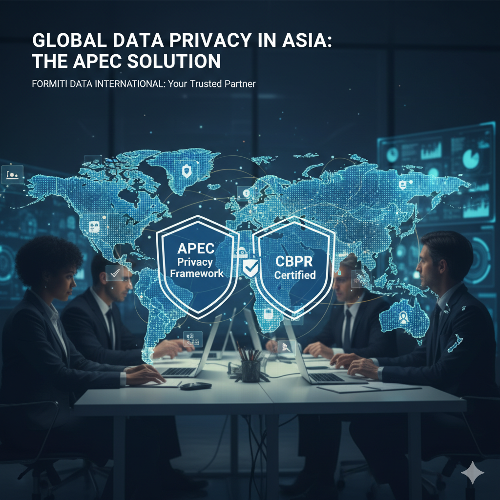A Guide to the APEC Privacy Framework: Enabling Cross-Border Data Flows for Global Organisations
Executive Summary: Navigating Data Privacy in the Asia-Pacific
For global organizations, the Asia-Pacific (APAC) region represents enormous opportunity, but also a complex and fragmented data privacy landscape. Unlike the EU's unified GDPR, Asia consists of a diverse patchwork of national privacy laws. This creates significant compliance challenges for companies needing to transfer data across borders.
This is where the Asia-Pacific Economic Cooperation (APEC) Privacy Framework and its key component, the Cross-Border Privacy Rules (CBPR) System, become critical.
This article serves as a comprehensive guide for global business leaders, compliance officers, and IT professionals. It breaks down what the APEC Framework is, how it functions, and why it is a vital strategic tool for any company operating in the region. Understanding this framework is the first step in building a resilient and efficient data strategy, and at Formiti Data International, we specialize in helping companies navigate this exact challenge.
What is the APEC Privacy Framework?
The APEC Privacy Framework is a voluntary, principles-based framework designed to harmonize data privacy and protection standards among the 21 APEC member economies.
Its primary goal is not to create a single, overarching law, but to facilitate economic trade and growth by enabling responsible and secure cross-border data flows. It provides a common set of principles that member economies and the organizations within them can adopt to build trust and ensure baseline privacy protections for personal information.
The framework itself is built on Nine Core Privacy Principles:
- Preventing Harm: Protecting individuals from the privacy risks of data collection.
- Notice: Ensuring individuals are aware of what data is collected and how it's used.
- Collection Limitation: Collecting only data that is relevant and necessary.
- Use of Personal Information: Limiting the use, transfer, and disclosure of data.
- Choice: Providing individuals with mechanisms to opt-in or opt-out where appropriate.
- Integrity of Personal Information: Ensuring data is accurate, complete, and up-to-date.
- Security Safeguards: Implementing technical and organizational measures to protect data.
- Access and Correction: Allowing individuals to access and correct their personal data.
- Accountability: Holding organizations responsible for complying with the principles.
The Key Mechanisms: CBPR and PRP Explained
The APEC Framework is operationalized through two key, voluntary systems. These are the "how-to" components that global companies must understand.
1. The Cross-Border Privacy Rules (CBPR) System
- What it is: The CBPR system is a certification system for data controllers (organizations that determine the "why" and "how" of data processing).
- How it works: A company voluntarily subjects its internal privacy policies and practices to a third-party review by an APEC-recognized "Accountability Agent." If the company's policies align with the 9 APEC Privacy Principles, it receives CBPR certification.
- The Benefit: This certification acts as a "stamp of approval." It demonstrates to partners, consumers, and regulators in other APEC CBPR economies that the organization can be trusted to handle personal data responsibly. It is a key mechanism for justifying cross-border data transfers between participating countries.
2. The Privacy Recognition for Processors (PRP) System
- What it is: The PRP system is a similar certification designed for data processors (organizations that process data on behalf of a controller, such as cloud providers or payroll services).
- How it works: A processor demonstrates to an Accountability Agent that it has the systems and policies in place to effectively protect data it processes for its clients.
- The Benefit:For a global organization (a data controller), using a PRP-certified vendor provides a high degree of assurance that its supply chain is secure and compliant, simplifying its own due diligence requirements.
Why Should Global Organisations Care About APEC CBPR?
For companies doing business in Asia, participating in the CBPR system is not just a compliance exercise; it is a strategic business enabler.
- Simplifies Data Transfers: The CBPR system is one of the only recognized mechanisms that can legally facilitate data flows between major economies like the USA, Japan, Singapore, South Korea, Canada, Australia, and Taiwan (among others). It can serve as a "data bridge" where other mechanisms, like adequacy decisions, may not exist.
- Builds Trust and Enhances Reputation: A CBPR certification is a public declaration of your company's commitment to data privacy. This builds invaluable trust with consumers, business partners, and regulators.
- Reduces Compliance Fragmentation: Instead of navigating dozens of different national rules, the CBPR provides a single, high-level standard. Achieving it helps streamline a significant portion of your regional compliance efforts.
- Provides a Competitive Advantage: Being CBPR-certified can be a key differentiator, especially when bidding for contracts or seeking partnerships with other multinational corporations who mandate high privacy standards.
Frequently Asked Questions (Q&A) Business Leaders
This section directly answers the most common questions about the APEC Privacy Framework,
Q: Is the APEC Privacy Framework a law like the GDPR?
A: No. This is the most common misconception.
- The GDPR is a mandatory, prescriptive law with global reach and severe penalties for non-compliance.
- The APEC Framework is a voluntary, principles-based framework. Its "enforcement" comes through the certification process via Accountability Agents and the commitments made by participating economies. An organization is not "fined" for not being APEC certified, but it may lose the ability to easily transfer data.
Q: Does APEC CBPR certification make me GDPR compliant?
A: No. While there is significant overlap in their principles (e.g., notice, security, access), their legal mechanics are different. GDPR has specific requirements (like Data Protection Officer roles, 72-hour breach notices, and Data Protection Impact Assessments) that the APEC Framework does not explicitly mandate.
However, a company that is CBPR certified is already in a very strong position to achieve GDPR compliance, as the foundational data governance is already in place.
Q: Which countries participate in the APEC CBPR system?
A: As of late 2024, participating economies include Australia, Canada, Japan, South Korea, Mexico, the Philippines, Singapore, Chinese Taipei (Taiwan), and the United States. This list is expected to grow as more economies see the value in data-driven trade.
Associate Members: The United Kingdom, Bermuda, the Dubai International Financial Centre, and Mauritius are Associate Members. They can participate in discussions but do not offer the certification to their local organizations
Q: What is an "Accountability Agent"?
A: An Accountability Agent is an independent, third-party organization that has been recognized by APEC to assess and certify companies for the CBPR and PRP systems. They act as the auditors who review a company's privacy program against the APEC standards.
Q: How do I get my company APEC CBPR certified?
A: The process generally involves four steps:
- Internal Assessment: Conduct a gap analysis of your current privacy policies against the 9 APEC Privacy Principles.
- Remediation: Update policies, procedures, and technical controls to fill any identified gaps.
- Engage an Accountability Agent: Select an APEC-recognized agent and submit your application and supporting documentation.
- Audit and Certification: The agent will review your materials, potentially interview staff, and issue the certification if all requirements are met.
Your Trusted Partner for APAC Data Strategy
Navigating the complexities of the APEC Privacy Framework, the CBPR certification process, and the patchwork of national laws in Asia requires specialized expertise. A failed audit or a misstep in data handling can lead to blocked data flows, broken trust, and significant operational disruption.
Formiti Data International is a leader in global data privacy and compliance. Our team of experts has a deep understanding of both the APEC framework and the specific national laws of key Asian markets.
We don't just provide advice; we partner with you to:
- Conduct Gap Analyses to see how your current practices stack up against CBPR requirements.
- Develop and Implement the necessary policies, procedures, and documentation for certification.
- Liaise with Accountability Agents on your behalf to streamline the certification process.
- Build a Holistic Data Strategy that integrates your APEC compliance with other global requirements like GDPR.
Don't let data privacy complexity hinder your growth in Asia.
Would you like to schedule a consultation with a Formiti data privacy expert to assess your organization's APEC readiness? Click here

